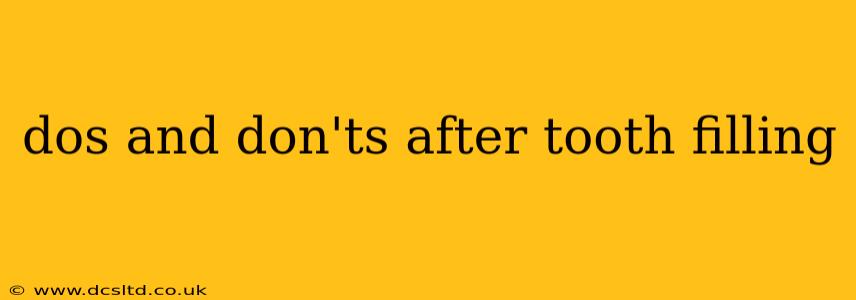Getting a tooth filling is a common dental procedure, but proper aftercare is crucial for a successful outcome and to prevent complications. This guide outlines the essential dos and don'ts to ensure a smooth recovery and maintain the health of your newly filled tooth.
What to Do After a Tooth Filling
Following your dentist's instructions is paramount, but here are some general guidelines:
1. Manage Pain and Swelling:
Most patients experience some mild discomfort or sensitivity after a filling. Your dentist will likely prescribe pain medication, which should be taken as directed. Applying a cold compress to the affected area can also help reduce swelling and pain. Remember to alternate between 20 minutes on and 20 minutes off to avoid skin irritation.
2. Gentle Cleaning:
Once the numbness wears off, gently clean your teeth, avoiding the filled tooth as much as possible for the first 24 hours. Use a soft-bristled toothbrush and fluoride toothpaste, being extra careful not to put pressure on the filling.
3. Healthy Diet:
Avoid extremely hot or cold foods and drinks for at least 24 hours, as they can cause sensitivity. Stick to soft, easily chewable foods to prevent putting undue pressure on the filling. Examples include yogurt, mashed potatoes, and applesauce.
4. Monitor for Complications:
Keep a close eye on the filled tooth and surrounding area. If you experience persistent or severe pain, swelling, infection (pus), or any other unusual symptoms, contact your dentist immediately. Early intervention is key to addressing any potential problems.
5. Schedule a Follow-up Appointment:
Your dentist will likely schedule a follow-up appointment to check on the healing process and ensure the filling is intact. Attend this appointment as scheduled to allow for early detection of any issues.
What NOT to Do After a Tooth Filling
Ignoring these recommendations can jeopardize the longevity and success of your filling.
1. Avoid Chewing on the Filled Tooth:
For at least 24 hours, avoid chewing directly on the filled tooth. This prevents dislodging the filling and causing further damage. Allow the filling material to fully set and bond with the tooth structure.
2. Don't Smoke or Use Tobacco Products:
Smoking and tobacco use can interfere with the healing process and increase the risk of infection. This is especially critical in the immediate post-filling period.
3. Avoid Alcohol Consumption:
Alcohol can thin your blood and increase the risk of bleeding, potentially affecting the healing process. Moderation or complete abstinence is advisable for at least 24 hours.
4. Refrain from Using Mouthwash (Initially):
Avoid using mouthwash, especially those containing alcohol, for the first 24 hours. This prevents irritation of the sensitive area and allows the filling to set properly. After 24 hours, you can resume using a non-alcohol based mouthwash.
5. Don't Bite on Hard Objects:
Refrain from biting on hard objects like ice, hard candies, or pencils, as this can damage or dislodge the filling. Maintain this caution for the first few days to prevent premature wear and tear.
Frequently Asked Questions (FAQs)
How long does it take for a tooth filling to fully set?
Most fillings set within a few hours, but it's best to avoid significant pressure or chewing on the tooth for at least 24 hours to ensure complete bonding.
What should I do if my filling falls out?
If your filling falls out, contact your dentist immediately. A loose or missing filling can lead to further tooth decay and damage.
Can I eat anything after a tooth filling?
While you should avoid very hot or cold foods and hard foods for 24 hours, you can generally eat a normal diet after that, focusing on softer foods initially.
Is it normal to feel sensitivity after a filling?
Some sensitivity to temperature or pressure is common immediately after a filling. This usually subsides within a few days. However, persistent or severe sensitivity warrants a call to your dentist.
How long does the pain after a filling last?
The pain usually subsides within a few days. If it persists or worsens, contact your dentist to rule out complications.
By diligently following these dos and don'ts, you can significantly improve your chances of a swift and uncomplicated recovery after your tooth filling. Remember, maintaining good oral hygiene practices is crucial for long-term oral health.
